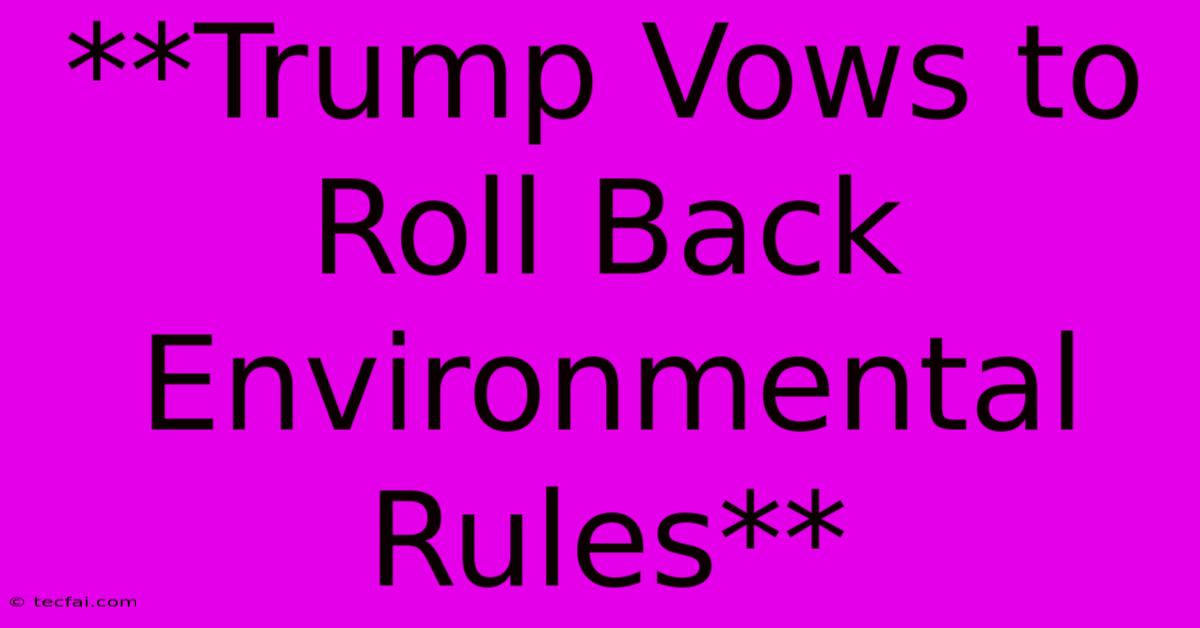**Trump Vows To Roll Back Environmental Rules**

Discover more detailed and exciting information on our website. Click the link below to start your adventure: Visit Best Website tecfai.com. Don't miss out!
Table of Contents
Trump Vows to Roll Back Environmental Rules: A Look at the Potential Impacts
Former President Donald Trump's tenure in office was marked by a consistent push to roll back environmental regulations, a move that ignited fierce debate across political and environmental circles. His administration aimed to deregulate industries, arguing that stringent environmental rules hampered economic growth and job creation. However, environmental advocates raised concerns about the potential consequences of these policy changes, highlighting the potential for increased pollution and harm to public health and the environment.
Key Environmental Rollbacks Under Trump:
- Clean Power Plan: This Obama-era plan sought to reduce carbon emissions from power plants, a key target for combating climate change. The Trump administration replaced it with the Affordable Clean Energy (ACE) rule, which placed less stringent requirements on emissions.
- Waters of the United States (WOTUS) Rule: This rule defined which bodies of water fall under federal jurisdiction, impacting development and pollution regulations. The Trump administration revised the rule, significantly narrowing its scope and potentially leaving more waterways vulnerable to pollution.
- Endangered Species Act: The administration proposed changes to the Endangered Species Act, aiming to streamline permitting processes and potentially limit protections for endangered species.
- National Environmental Policy Act (NEPA): Trump's administration sought to streamline environmental reviews under NEPA, potentially expediting infrastructure projects while also raising concerns about the adequacy of environmental assessments.
- Fuel Efficiency Standards: The Trump administration rolled back fuel efficiency standards for vehicles, arguing that they were overly burdensome. This move drew criticism from environmental groups, who argued it would increase greenhouse gas emissions.
Arguments for and Against Environmental Rollbacks:
Proponents of the Trump administration's approach argued that overly strict environmental regulations stifled economic growth and job creation. They believed that businesses were unfairly burdened by regulations and that a more lenient approach would allow for greater economic prosperity.
However, environmental advocates argued that rolling back environmental protections would have detrimental consequences for public health and the environment. They pointed to the potential for increased air and water pollution, threats to wildlife and habitats, and exacerbation of climate change.
The Legacy of Environmental Rollbacks:
The Trump administration's environmental policies have left a lasting impact. While some argue that they fostered economic growth, others point to the environmental damage they may have caused. The long-term consequences of these rollbacks remain to be seen, but the debate over their impact is likely to continue for years to come.
Further Reading:
- The Environmental Protection Agency (EPA): The EPA is the primary federal agency responsible for protecting human health and the environment.
- The National Environmental Policy Act (NEPA): NEPA is a federal law that requires federal agencies to assess the environmental impacts of their proposed actions.
- The Endangered Species Act: This law protects endangered and threatened species and their habitats.
This article aims to provide a balanced overview of the Trump administration's environmental policies, acknowledging both the potential benefits and drawbacks of these changes. It is crucial to continue engaging in informed discussion and debate about the best path forward in protecting our environment while also ensuring a thriving economy.

Thank you for visiting our website wich cover about **Trump Vows To Roll Back Environmental Rules**. We hope the information provided has been useful to you. Feel free to contact us if you have any questions or need further assistance. See you next time and dont miss to bookmark.
Featured Posts
-
Mount Lewotobi Exclusion Zone Expanded
Nov 12, 2024
-
Jolies Path Forward After Difficult Past Years
Nov 12, 2024
-
Haiti Gunfire Incident Injures Spirit Flight Attendant
Nov 12, 2024
-
700 000 New Bluesky Users Swifties Join Platform
Nov 12, 2024
-
Tourist Support In Indonesia After Lewotobi
Nov 12, 2024
